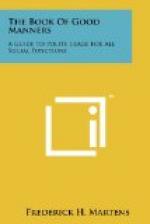The signature
of a man should be John J.
Wilson or
J. Jones Wilson.
An unmarried woman should sign social letters as Minnie Wilson, and a business letter as Miss Minnie Wilson. A married woman should sign a social letter as Agnes Wilson. In signing a business letter, a married woman may either sign her name Mrs. Agnes Wilson, or, preferably,
Agnes Wilson
(Mrs. John
Wilson)
Afternoon calls. These should be made
between
three and
half-past five, and if possible on
regular
at home days.
In making
an afternoon call a man should
wear the
regulation afternoon dress.
Dress—men. Afternoon
dress consists of a
double-breasted
frock coat of dark material,
and waistcoat,
either single or double-
breasted,
of same, or of some fancy material
of late
design. The trousers should be of
light color,
avoiding of course extremes in
patterns.
White or delicate color linen
shirts should
be worn, patent leather shoes, silk hat and
undressed kid gloves of dark color.
Afternoon dress is worn at weddings, afternoon teas, receptions, garden parties, luncheons, church funerals, and at all afternoon functions.
See also evening dress—men.
Morning
dress—men.
Afternoon receptions. See afternoon
teas.
Given by bachelors, See
bachelors’ teas.
Afternoon teas (formal). These
are very successful
as a rule,
due perhaps to their small expense
and few
exactions, and are given with
many purposes:
to introduce young women
into society,
to allow a hostess to entertain a
number of
her friends, to honor some woman
of note,
etc.
A formal
afternoon tea is one for which
cards have
been issued, naming set date.
Awnings and carpet should be provided from curb to house. A man should be stationed at the curb to open carriage doors and call them when the guests leave, and another African Teas man should be in attendance at the front door to open it the moment a guest appears at the top step and to direct him to the dressing-room.
A policeman
should be detailed for the occasion
to keep
back the onlookers, and should
receive
a small fee for his services.
At the door of the drawing-room a man should ask the name of each guest, which he announces as the latter enters. The hostess and those receiving with her should be just within the door to receive the guests.
Cards. Each guest should leave
a card in the
tray in
the hall.




